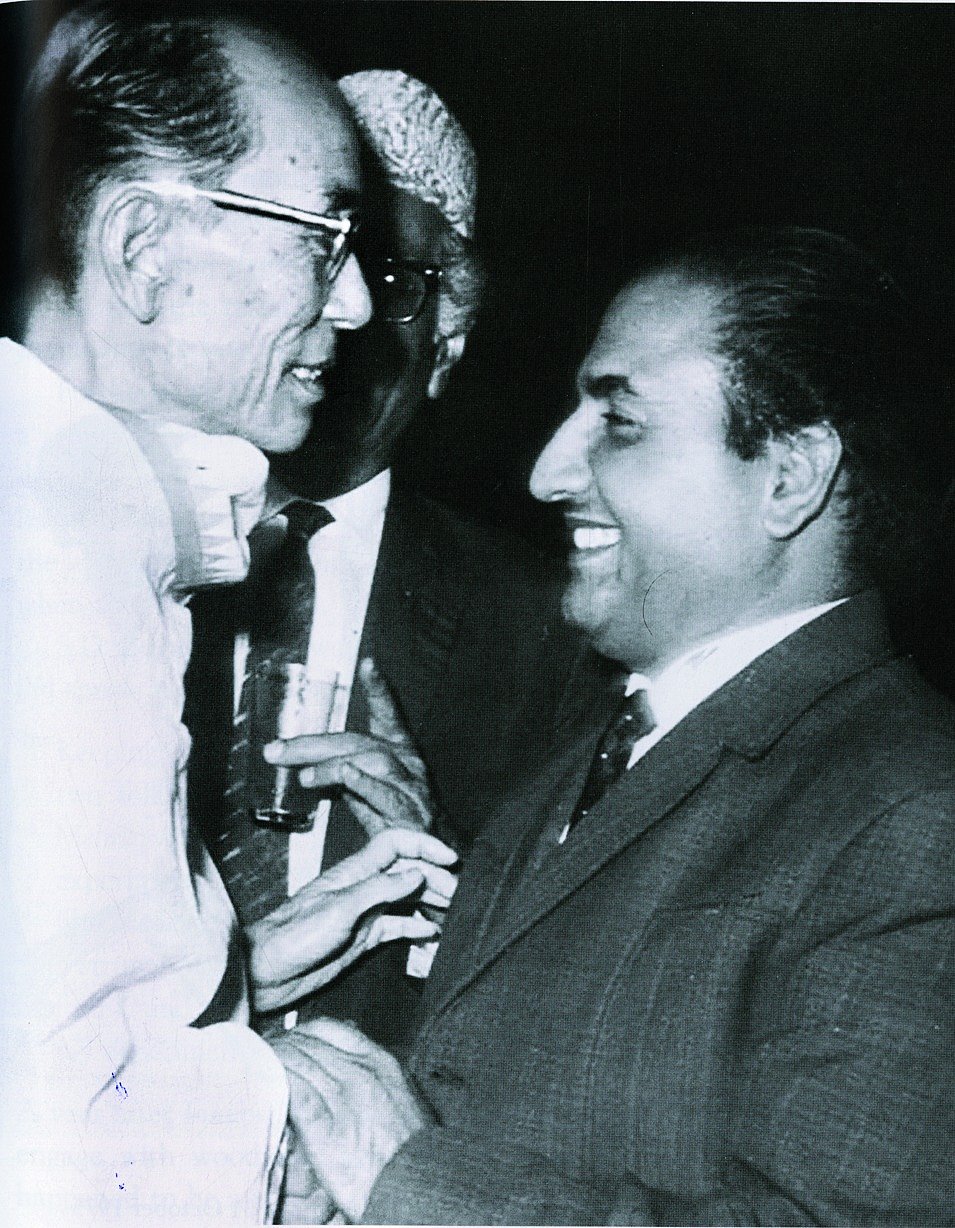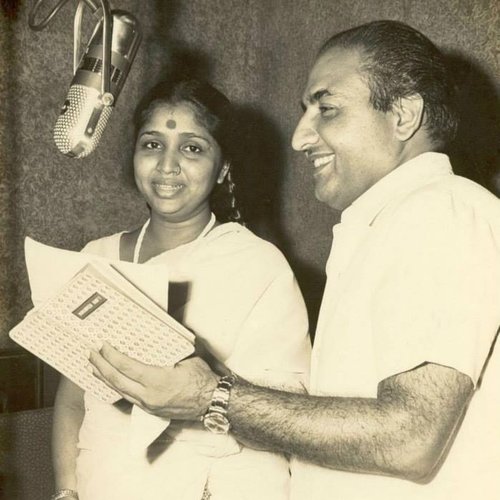
![]()
Mohammed Rafi
A name synonymous with melody, versatility and giftedness.
A name that spells virtuosity and virtuousness; magnanimity and musicality; simplicity and sagacity.
A voice that resonates across generations, transcending barriers and boundaries.
A voice that rings with truth, sincerity and divinity.
A voice that embodies and evokes every emotion it’s meant to.
A voice that has reached millions of hearts and touched their souls.
And today, Dec 24, is a momentous occasion, a significant milestone that calls for a celebration of the man and his music. For today, Rafi sahab, as he is popularly referred to, celebrates his 100th birthday.

![]()


I cannot remember a time in my life without Rafi sahab's voice in it, though my earliest memory as far as I can recollect are the songs from Baiju Bawra playing on my dad’s reel-to-reel tape. I suppose, growing up, listening to his songs play all the time - in my home, on the radio, on public speakers during festivals and weddings, on TV - I began to gloss over it, treating it as background noise. After all, things that are too familiar do tend to get taken for granted. As I grew older, my musical pathways also branched out and my musical world expanded and I followed, delving into several genres and artistes. But now, just like at the end of life, a man goes on a spiritual quest, I find that my appreciation has circled back to Rafi. It feels like I’ve been on a long, arduous, sometimes fulfilling journey only to return to my safe haven, my comfort zone, my home. And that is Rafi sahab’s voice.
What can I write about him that you don’t already know? What can I say as an ardent fan that is not copy-pasted off any already published articles or interviews, or something that is not ChatGPT generated banality?
Well, I figure a tribute to Rafi sahab - a man who was all heart - is best told straight from the heart.

![]()

Still, I have to start from his origins - his birth in 1924 in the tiny village of Kotla Sultan Singh in Punjab, and how young “Pheeko”, fascinated by a travelling fakir, would follow him for miles and return imitating his singing to perfection. When his family moved to Lahore, he began training in Classical music under Ustad Abdul Wahid Khan, Pandit Jeevan Lal Mattoo and Firoze Nizami. Young Rafi idolized K.L. Saigal so it was only befitting that his first break came indirectly via his idol. When a Saigal concert threatened to be disrupted on account of a power failure, Rafi was called upon to entertain an irate audience, which he did admirably, holding them spellbound for hours. Shyam Sunder, who was present in the audience, was struck by the young teen’s stage presence and prowess and invited him to Bombay. Soon, Rafi sang his first film song for Shyam Sunder in the Punjabi film Gul Baloch, followed by his Hindi film break in 1945 with Gaon ki Gori.
His initial days in Bombay were not a cakewalk though eventually he had several hits with C. Ramchandra, O.P, Nayyar and Naushad. It was only much later in 1957, with Pyaasa, that he really came into his own and grew into what we identify him with most - his uncanny ability to be the ‘voice’ of the actor on screen, embodying that actor’s persona so well that it would seem as though the actor was singing himself. This ‘voice acting’ and the stressing and inflections on words that also sets him apart from his contemporaries is something he learned from S.D. Burman during Pyaasa. {X}

Burmanda’s influence is clear though. I urge you to watch ‘Sar jo tera chakraye’ - it’s impossible to tell where Johnny leaves off and Rafi begins. The back and forth between Johnny’s speech and Rafi’s singing is seamless. Similarly, in ‘Hai duniya usi ki’ Rafi IS Shammi and Shammi is Rafi. The singer and actor are so attuned to each other that it feels like their souls have melded into one, it’s difficult to separate one from the other. Note especially the harkats and tonal stresses he brings to ‘Hai sajde ke kaabil’ in the second iteration and how Shammi plays it on screen. That calls for intuitiveness of the highest order. A miracle, if I can call it that.
But these are facts that most people know or can be easily read up. I'd want this write-up about him and his songs and my own personal reflections on them.

![]()

It’s true Rafi did sing some bad songs, but then so did every singer. As a composer, more often than not, you have more duds than you have hits. And it’s virtually impossible for every song in a soundtrack to be a good one or a hit. It was also his innate nature that he couldn’t deny new and upcoming or struggling music directors. Who hasn’t heard of these stories - maybe apocryphal but definitely with a layer of truth - of people claiming to have received money orders from him for years only for them to suddenly cease after his death, of the fact that he gave away an envelope full of money to someone in need stating he didn’t need to count it since he certainly didn’t count the money he received, of how he bought his long time driver a taxi when the man could not adapt to driving his left-hand-drive Impala just so that the man wasn’t left jobless.
Some may call it naivete, others may call it selflessness, but his generosity extended to all spheres, so why would he not do the same for struggling producers or music directors? Even his much talked about rift with Lata on the royalty issue came from this lack of entitlement and complete humility.
There were also some who felt he had ruined his voice and repertoire by singing these mediocre songs. Surely not! Does a man who runs everyday when attempting to train for a marathon ruin his chances of completing it? To my mind, the more he sang, the better he got as a singer. That was his riyaaz. So yes, he was prolific, but that only made him more polished. I have noticed this even in songs that I had hitherto ignored or dismissed. He brings his A-game to every one of them.

![]()

Another oft brought up argument to dismiss his standing is that Rafi Sahab only sang what the composer taught him and did not improvise on the tunes.
Now this one honestly makes me laugh. You’re saying this about a man who literally wrote the textbook on playback singing? Who created a bar, a benchmark, that young singers even now strive to reach? Who created a reference point for upcoming singers to emulate and learn from? Every new artiste from Shailendra Singh to Jubin Nautiyal has talked about how Rafi sahab is their reference point for learning perfection in delivery.
Yes, Rafi sahab did consider the composer as the creator of the song and would give immense respect to how the composer wanted the song to be sung. He would also ask the composer to sing the tune to him. Usha Khanna has talked about how stunned she was when Rafi sahab, an established singer, deferred to her vision in Dil deke dekho, when she was all of 17 years old and it was her first time composing for Hindi films! He would make notes on where he needed to place emphasis and where a muted delivery was needed, but some of the harkats he added were definitely his own.
Who can forget the myriad ways in which he sang one word ‘accha’ in the song ‘Ye zulf agar khulke’? Or the way he scales down one note in every line in mukhda of ‘Ae gulbadan’ giving accomplished masters a run for their money? Rafi sahab sounds so effortless in this, but believe me, this song is damn difficult to sing without losing your voice either in the higher or lower notes.
Lata Mangeshkar has herself spoken of how the song ‘Ehsaan tera hoga’ was recorded first in Rafi’s voice and Saira Banu lip-synced to it. Lata had to then match Saira’s on-screen lip movements and Rafi’s range which she found extremely difficult to do. Asha Bhosle has also spoken of his enviable range and control in the high scales. Who else could sing ‘O duniya ke rakhwale’, “Badi der bhayi", ‘Daman mein daag laga baithe’ or any of those songs with impossibly high notes without a strain in their voice? And forget about scaling high notes in his natural voice, he has actually changed his voice to a high-pitched soprano in the final coda of ‘Dilruba dil pe tu’. It’s so badass.
The way he stresses on different words during the song to highlight the mood or the emotion can be a whole subject of study and thesis all by itself. And the way he can elevate an ordinary composition to something extraordinary. Or even an extraordinary composition into something other-wordly. Take the brilliant qawwali ‘Na toh caravan ki talash hai’ with stalwarts such as Mannadey, Asha Bhosle, Sudha Malhotra, S.D. Batish hitting it out of the park. But when Rafi sahab comes in, the song seems to ascend several levels. Just listen to his rendition of the last part from ‘Allah aur rasul ka farmaan ishq hai’ to ‘Ishq intiha ye hai ke bande ko khuda karta hai ishq” - I dare you not to have goosebumps!

![]()

Mannadey, an accomplished singer himself, has said he could never do what Rafi sahab could. Mukesh would advise his son, Nitin Mukesh, to learn Rafi’s songs if he wanted to be recognized as a good singer. In the words of Talat Mahmood, a contemporary and competitor: “The voice was a gift from God to Rafi, but what Rafi made of it was a gift to God.”
The fact that he has sung every type of song, every genre and every mood cannot be refuted. Add to it all these techniques and the unique flavors he added to them, including yodeling. If these don’t count as improvisation, what does?
Whether you’re a staunch fan or just an observant music lover, you would have noticed one more thing about him. Rafi sahab thought about the quality of the end product so he never felt the need to show one-upmanship over his co-singer while singing. He was also not afflicted with insecurity which is why he always sang as per the demand of the situation.
Remember ‘Teri bindiya re’ from Abhimaan? Jaya Bhaduri’s character was supposed to be the better singer, so Rafi had to come across more muted and subdued compared to Lata, which he did. Do you think Rafi could not have sung the harkats that Lata did? Or that he could not sing the murki in the second line of ‘Aaja Aaja’s stanza that Asha Bhosle did? Or that he could not deliver the same tonal movements in ‘Hai agar dushman’ that Asha delivered when he has done much more complicated stuff? In both cases, Asha Parekh and Zeenat Aman were supposed to bring a wow factor so it made sense for Asha Bhosle to add extra movements to her rendition as compared to Rafi. He toned himself down keeping the situation on screen in mind. It was never about himself, to demonstrate how good a singer he was, or to prove a point to the audience or anyone else, it was always about the character, the situation and what emotions needed to be conveyed. That does not diminish Rafi’s prowess at all. If anything, it adds a layer of professionalism to the man’s demeanour.


Another often repeated idea is that Rafi sahab began to lose his voice in the 70s and was less preferred by composers, spelling his decline.
To this I say, well yes, he was singing less but it wasn’t because of his voice declining. Rafi sounded just as good even in his last song before his death - listen to him in “Tu kahin aas paas hai dost” (this song just hits different when you know it was his last).
It’s just that the 70s brought in a new wave that spelt changes to the landscape of Hindi cinema and the audience’s sensibilities; we saw the advent of the angry young man persona. Rafi Sahab’s voice was possibly perceived by some to be unsuitable for that kind of leading man, though I would argue this. Before you say I’m biased (which I admit I am), we did have soft baritones like Shailendra Singh, Suresh Wadkar, Yesudas etc being successful during this time. In any case, the fact remains that producers would pressure composers to use a particular singer based on their perceptions of what the audiences wanted, and composers would have to concede. More often than not, it did not reflect the music director’s own preference. Besides, Rafi sahab himself went through a personal crisis of sorts where he began questioning his singing for films for religious reasons and went away to London for a while, taking a step back from active playback.
But even so, when composers wanted him, they used him. He remained the favorite of Laxmikant-Pyarelal with whom he recorded the maximum songs. He did have some of the biggest hits of his career in the 70s. Who can forget ‘Teri galiyon mein na rakhenge kadam’, “Tum jo mil gaye ho’, ‘Mera mann tera pyaasa’, ‘Chura liya hai’, ‘Vaada kar le sajna’, ‘Parda hai parda’ and the National Award winning ‘Kya hua tera vaada’?

To summarize, I think his voice was perfectly suited to the Golden Era - times when melody was king and composers were at their peak. In my view, the composers lucked out by having him and he, in turn, lucked out that he got to sing for stalwarts like S.D. Burman, O.P. Nayyar, Shankar Jaikishan, Naushad, Roshan, Madan Mohan, Chitragupta, N. Dutta and the likes of them. Come to think of it, his career span wasn’t that long if you only count the 50s and 60s when he had the maximum hits. It’s amazing that the impact he made in these two decades reverberates even now, decades later!

![]()

Circling back to the man, his family and people who knew him always said he was so soft-spoken you had to strain to hear him speak. He was also uncomfortable with fame, shy and unassuming. But when he came before the mike, he “roared like a lion”. His stage shows were very well attended and popular.
Rafi sahab might have felt embarrassed about being uneducated, but for a man who taught himself to sign his name in English for his fans, it must definitely be validating and somewhat ironic that two of his songs (perhaps more that I’m not aware of) were featured in Hollywood films. The YouTube comments under ‘Jaan Pehchaan ho’ are especially worth reading. I hope Rafi Sahab is smiling his trademark smile up there!
I will make this last, somewhat cheesy, observation before signing off. Rafi’s birth date is 24-12-24. Not only is there a glorious symmetry to it but mathematically, if you add the digits they come up to a 6. So I conclude that it was destiny for him to be hitting sixes all the time!
I’m not one to deify anyone easily, but I will say this - other than M.S. Subbulakshmi, Rafi sahab’s voice is the closest I’ve come to experiencing divinity. No wonder he was called ‘Bhagwan ke aadmi’ and ‘Sant aadmi’ by so many!
Let me now desist from my fangirling soliloquy and invite you all to post your favorite Rafi songs in your own voice or the originals. You are welcome to post facts, trivia, anecdotes, interviews, tributes. Also do tell us about your earliest memory of hearing Rafi sahab, and how his songs have impacted you.
Please check out the next post for the complete list of activities you can participate in to celebrate Mohammed Rafi & his music.
Finally to Rafi sahab, I will say this:
Na jaane kis jahaan mein kho gaya hoon
Isi awaaz se chaunka tha lekin
Isi awaaz mein gum ho gaya hoon…..
Wherever you are Rafi sahab, Happy 100th birthday!
Sau baar fanaa honge … aapke geeton par!

![]()

Deepest thanks to oh_nakhrewaali for the tags




































